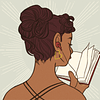Take a photo of a barcode or cover
Nije mi nes legla.. nisam osetio magiju kao u prošlim knjigama
Heck ya, Ursula K. Le Guin. I'm so happy to have finally completed the Earthsea trilogy--although I'm equally happy to see that there is more to come in the fourth book 'Tehanu,' which seems equally as well regarded amongst those who have read these fine books.
The Earthsea Cycle is one that feels ... so wonderfully quiet compared to a lot of classic or popular fantasy novels. It's not huge, loud, or brimming over with detail. Everything is so wonderfully succinct. And in fact, there's only a few key 'action' moments that usually take part in any of these books. The rest is travel, and thinking, and discovering--sprinkle a dragon in here or there, and you've got yourself a book. Sound dry as hell? Maybe for someone other than Ursula Kickass Le Guin.
The one thing that really struck me by the end of the tale of Ged and the young king Arren in this story, is that there's not really a traditional bad guy in any of these. The Farthest Shore has the most direct reference to a single person being the source of a lot of world's problems, but even these issues can be directly boiled down to this: fear of death. And in the two former books, Ged's and Tenar's struggle with their own emotions, pride, and darkness all feature prominently. It's amazing.
Just such fondness for this series. My only sad point is that Goro Miyazaki made such a mess of the film adaptation of something that could have been so very lovely.
The Earthsea Cycle is one that feels ... so wonderfully quiet compared to a lot of classic or popular fantasy novels. It's not huge, loud, or brimming over with detail. Everything is so wonderfully succinct. And in fact, there's only a few key 'action' moments that usually take part in any of these books. The rest is travel, and thinking, and discovering--sprinkle a dragon in here or there, and you've got yourself a book. Sound dry as hell? Maybe for someone other than Ursula Kickass Le Guin.
The one thing that really struck me by the end of the tale of Ged and the young king Arren in this story, is that there's not really a traditional bad guy in any of these. The Farthest Shore has the most direct reference to a single person being the source of a lot of world's problems, but even these issues can be directly boiled down to this: fear of death. And in the two former books, Ged's and Tenar's struggle with their own emotions, pride, and darkness all feature prominently. It's amazing.
Just such fondness for this series. My only sad point is that Goro Miyazaki made such a mess of the film adaptation of something that could have been so very lovely.
adventurous
emotional
hopeful
medium-paced
Plot or Character Driven:
A mix
Strong character development:
Yes
Loveable characters:
Yes
Diverse cast of characters:
No
LeGuin is one of the most beautiful writers I’ve had the opportune to read. Excellent book.
This is the best one so far, but it's not like the bar was very high.
There's a plot here, and there's a character with needs and desires and struggles and all that stuff that makes for, you know, fiction.
I thought this whole series was about Ged, but now I'm not sure. I'm very confused where this is all going, and I'm still not sure what exactly this book ended with. How can Arren possibly be satisfied with what he got out of this journey? I get that Ged has a satisfying end. He defeats a demon who was metaphorically his demon, and he's old, so losing his power doesn't matter. But Arren? Also, I thought the point of the trip was to restore magic to the land. Did that actually happen?
I have no idea what's coming next, aside from when I opened the next book and saw that Tenar is back. (But why now? Why did her story not actually have a point the first time?)
There's a plot here, and there's a character with needs and desires and struggles and all that stuff that makes for, you know, fiction.
I thought this whole series was about Ged, but now I'm not sure. I'm very confused where this is all going, and I'm still not sure what exactly this book ended with. How can Arren possibly be satisfied with what he got out of this journey? I get that Ged has a satisfying end. He defeats a demon who was metaphorically his demon, and he's old, so losing his power doesn't matter. But Arren? Also, I thought the point of the trip was to restore magic to the land. Did that actually happen?
I have no idea what's coming next, aside from when I opened the next book and saw that Tenar is back. (But why now? Why did her story not actually have a point the first time?)
Huzzah. Done with the original trilogy. Yay dragons and Sparrowhawk and the Children of the Sea and wizards in general. Now onto the next three books.
By far the best in the series so far. By sending the two main characters on a lonely voyage over sea, Le Guin eliminates the need for any supporting characters. Indeed, the few people the heroes encounter along the way have been transformed into mere shells of humanity, so Le Guin's tendency to produce two dimensional (or even one-dimensional) supporting characters actually works to her advantage here.
The story, too, is quite compelling--a moving allegorical tale of the danger of pursuing immortality and power and your own self-interest. It has all the elements of good fantasy: dragons, magic, a young prince, an old wizard, strange lands, friendship, loyalty, danger, courage, self-sacrifice. Once again, there are glimpses of Harry Potter, though this time Ged, the young wizard prodigy in A Wizard of Earthsea, is himself the careworn master wizard with a protegee of his own.
I'm still not as blown away by Le Guin as I expected to be, based on her reputation, but I look forward to reading more (after all, I haven't read any of her (many) Nebula and Hugo award winners).
The story, too, is quite compelling--a moving allegorical tale of the danger of pursuing immortality and power and your own self-interest. It has all the elements of good fantasy: dragons, magic, a young prince, an old wizard, strange lands, friendship, loyalty, danger, courage, self-sacrifice. Once again, there are glimpses of Harry Potter, though this time Ged, the young wizard prodigy in A Wizard of Earthsea, is himself the careworn master wizard with a protegee of his own.
I'm still not as blown away by Le Guin as I expected to be, based on her reputation, but I look forward to reading more (after all, I haven't read any of her (many) Nebula and Hugo award winners).
adventurous
dark
mysterious
medium-paced
adventurous
hopeful
reflective
slow-paced
Plot or Character Driven:
A mix
Strong character development:
Yes
Loveable characters:
Yes
Diverse cast of characters:
Yes
Flaws of characters a main focus:
Yes
adventurous
challenging
dark
hopeful
reflective
sad
fast-paced
WOW I LOVE THIS




